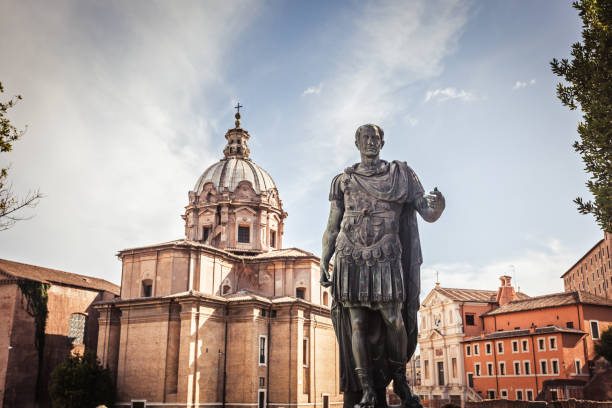Last Updated on February 9, 2023

Julius Caesar was, without a doubt, the most iconic military leader in history. Aside from his unquestionable tactical skills, the Roman commander distinguished out for his personal leadership lessons to his men, to whom he knew how to pass on his vision and knowledge. Caesar’s warriors repaid him for his many triumphs by restoring his trust.
Julius Caesar turned Rome from a burgeoning empire to a powerful one. Caesar became one of the most feared leaders in history after numerous battles, affairs, and risks. For many years, he had other leaders fleeing or attempting to overthrow him, but none of the foreign leaders succeeded.
Caesar was not only a formidable military commander, but he was also one of the most astute leaders of his day. Julius Caesar was a successful leader because he knew how to control his power and popularity, as well as how to handle foreign policy and demonstrate his abilities. Julius Caesar was a master at motivating people and manipulating events in his favour.
We’ve gathered the following four vital lessons from him for anyone aspiring to be a great leader:
Connect with your people
Caesar’s ability to connect with his followers was one of his strongest abilities as a leader. He was said to know his centurions by name and made an attempt to form personal bonds with them. Also, he trained with them, which helped him build relationships with his men.
Caeser referred to his troops as “comrades” rather than “men” or “soldiers” in his remarks. This instilled in his troops a “we versus them” mentality and connected them to him – Caesar’s success was dependent on the success of his forces, and ultimately Rome’s triumph. Caesar built a relationship of trust, pride, and solidarity with his men, which resulted in his army’s successes. He also awarded prizes for bravery and valour. The awarded soldiers were singled out and made to feel special, enhancing their devotion to Caesar.
Your leadership is strengthened when you connect with your team. This does not imply that you must be best friends with everyone on your team; rather, you should regard each member as an individual with their own abilities, objectives, and dreams. Connect with them as individuals, not simply as coworkers. Organizing a team building day outside of the office can be a fun way to get to know your coworkers.
Become a ‘Jack-Of-All-Trades’
Caesar’s arsenal of skills and qualities made him such a strong leader. He was a talented speaker who knew how to employ rhetoric well, among other things, had a dynamic and outgoing attitude that drew people to him quickly and had a high risk tolerance and was willing to take calculated risks in his pursuit of power. He also possessed a strong work ethic and was willing to go to any length to achieve his objectives. His military prowess was, of course, the foundation of his leadership. Caesar distinguished himself from his contemporaries by developing his own unique brand as a military leader using his skills and qualities.
Develop all-around leadership qualities to set yourself apart as a leader. Assess your leadership strengths and shortcomings, and then focus on the skills that will help you be more effective. It could be about honing your communication skills, gaining confidence in public speaking, or expanding your technical knowledge. Whatever it is, make an effort to improve your skillset, as a leader’s learning never stops!
Sharp communication skills
Julius Caesar, like many other Roman leaders and soldiers, was a gifted orator. He used to show up in the Roman Senate immaculately dressed and deliver impassioned speeches to his warriors. The amount of intelligence available to the Roman legions on the battlefield was a big aspect of their success. Every centurion knew as much about the war plan as Julius Caesar himself.
Centurions would represent the team or department supervisors in today’s office. As a leader, you must ensure that these individuals are well informed and understand your viewpoint so that they can communicate what has to be done to the rest of the team. A good leader is interested in mastering communication strategies that can help him deliver messages effectively and engage his team. Simulators can be used to strengthen these skills through practice, resulting in more solid and efficient learning.
Celebrate your victories
Part of the reason we know so much about Caesar and his military prowess is that he took the time to record his successes in writing. His writings on the Gallic and Civil Wars are still considered classic accounts of military history and strategy today. The Commentaries were written during Caesar’s time to strengthen his reputation as a formidable military leader and to increase his support base in Rome while he was fighting battles overseas.
It may be overkill to write a book about your own triumphs, but communicating and celebrating wins (however minor!) with your team can be quite beneficial. We are frequently engrossed in everyday tasks and deadlines, and we fail to recognise accomplishments. Victories are a great opportunity to praise and acknowledge your teammates for a job well done, as well as provide an incentive to keep going and achieve your goals. Even something as basic as a thank-you meal or some time off from work might help your team’s mood!
Who was Caesar? A Short Biography
Gaius Julius Caesar was born into a patrician family on July 13, 100 BC. His early years are shrouded in mystery. After his father died unexpectedly at the early age of 16, he became the head of his family. During this time, a civil war erupted between his uncle Gaius Marius and his political adversary Lucius Cornelia Sulla.
Caesar married Cornelia, the daughter of Marius’ supporter, and became the new high priest of Jupiter when Marius was in power. Unfortunately for Caesar, Sulla eventually triumphed, and he lost his priesthood, inheritance, and wife’s dowry. To evade Sulla’s fury, he went into hiding. Caesar’s military career began as a result of this incident when he decided to leave Rome and join the army.
In 69 BC, he became military tribune and later quaestor, which launched his political career. He began to create an alliance with Pompey, who had previously served under Sully. He also formed friendships with Marcus Licinius Crassus, another Roman general and one of Rome’s wealthiest men.
Caesar’s political ambitions landed him a consulship election in 60BC. He was elected and created the First Triumvirate with Crassus and Pompey after winning the election.
Caesar obtained a governorship during his consulship, giving him command of four legions. He utilised his governorship and four armies to conquer Gaul once his consulship ended. His reputation as a superb military leader was enhanced by this demonstration of military strategy and prowess.
Caesar defeated Pompey and his troops in Greece in 48 BC, and then returned to Rome to become a dictator. He was only dictator for a year, yet during that time he revolutionised the Roman Republic. Altering the Senate to make it bigger and more representative of Romans, reorganising local governance, and reforming the Roman calendar were among his accomplishments.
Politicians Gaius Cassius Longinus and Marcus Junius Brutus plotted Caesar’s assassination on the Ides of March, March 15th, 44 BC, motivated by jealousy and worry about Caesar’s growing power and influence. The killing of Caesar resulted in a power struggle and the fall of the Roman Republic. Two years after his death, he was the first Roman to be deified. He is known today as a fearsome military officer and statesman who is considered a historical icon.
Before you go…
Hey, thank you for reading this blog to the end. I hope it was helpful. Let me tell you a little bit about Nicholas Idoko Technologies. We help businesses and companies build an online presence by developing web, mobile, desktop and blockchain applications.
As a company, we work with your budget in developing your ideas and projects beautifully and elegantly as well as participate in the growth of your business. We do a lot of freelance work in various sectors such as blockchain, booking, e-commerce, education, online games, voting and payments. Our ability to provide the needed resources to help clients develop their software packages for their targeted audience on schedule is unmatched.
Be sure to contact us if you need our services! We are readily available.











